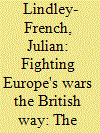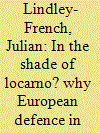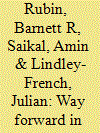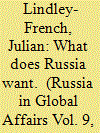| Srl | Item |
| 1 |
ID:
075727


|
|
|
|
|
| Publication |
2006.
|
| Summary/Abstract |
In September 2006 NATO's role in Afghanistan expanded to cover the whole of the country. With 32,000 troops under NATO command Stage 4 of the International Security Assistance Force (ISAF) represents an open-ended commitment to rebuilding a country long torn by war and instability. The Alliance's showpiece for advanced military transformation, the the NATO Response Force (NRF) represents a down payment on the future of transatlantic military co-operation. Taken together these two developments reflect the reality of NATO's new interventionism of an Alliance that bears little or no resemblance to that which won the Cold War. NATO today is an organisation designed for global reach and global effect, undertaking operations at their most robust. Unfortunately, the re-design of NATO's architecture has not been matched by a parallel development in Alliance military capabilities. NATO's big three, the US, Britain and France, have taken steps to improve their military capabilities. However, the transformation of NATO's other militaries has proved slow and uneven, leaving many members unable to fulfil any meaningful role. Thus, as NATO today plans for both robust advanced expeditionary warfare and stabilisation and reconstruction vital to mission success in complex crisis management environments a gap is emerging. Indeed, in an Alliance in which only the Americans can afford both military capability and capacity most NATO Europeans face a capability-capacity crunch, forced to make a choice between small, lethal and expensive professional military forces or larger, cheaper more ponderous stabilisation and reconstruction forces. This article explores the consequences of the crunch and the implications for NATO's current and future role as the Alliance struggles to find a balance between fighting power and staying power.
|
|
|
|
|
|
|
|
|
|
|
|
|
|
|
|
| 2 |
ID:
085051


|
|
|
| 3 |
ID:
021311


|
|
|
|
|
| Publication |
2002.
|
| Description |
74-76
|
|
|
|
|
|
|
|
|
|
|
|
|
|
|
|
| 4 |
ID:
022722


|
|
|
|
|
| Publication |
2002.
|
| Description |
789-811
|
|
|
|
|
|
|
|
|
|
|
|
|
|
|
|
| 5 |
ID:
075584


|
|
|
|
|
| Publication |
London, Routledge, 2007.
|
| Description |
xvii, 152p.
|
| Standard Number |
0415358798
|
|
|
|
|
|
|
|
|
|
|
|
Copies: C:1/I:0,R:0,Q:0
Circulation
| Accession# | Call# | Current Location | Status | Policy | Location |
| 052078 | 355.031091821/LIN 052078 | Main | On Shelf | General | |
|
|
|
|
| 6 |
ID:
064945


|
|
|
|
|
| Publication |
Apr-Jun 2005.
|
|
|
|
|
|
|
|
|
|
|
|
|
|
|
|
| 7 |
ID:
068169


|
|
|
| 8 |
ID:
086168


|
|
|
|
|
| Publication |
2009.
|
| Summary/Abstract |
The situation in Afghanistan has turned so far against the United States, NATO, the international community, and those Afghans who originally hoped that the post-11 September 2001 intervention would finally bring them a chance for normal lives, that it will be very difficult to salvage. Al-Qaeda has established a new safe haven in the Federally Administered Tribal Areas of Pakistan, from which it supports insurgencies in Afghanistan and Pakistan and continues its global planning against the United States and its allies. Its press releases are so frequent that they are hardly newsworthy unless they feature video of Osama bin Laden himself. Negative trends in Afghanistan include the deterioration of security, Afghan governance and regional stability. The stability of Pakistan, a nuclear-weapons state that has been the main source of proliferation over the past two decades, is now at serious risk. Rising India-Pakistan tensions further exacerbate the regional risk, as do tensions over Iran's nuclear programme and its relations with Hizbullah and Hamas.
The task in Afghanistan would have been difficult under any circumstances. The Bush administration's unique record of incompetence, fecklessness and criminality has assured that the Obama administration inherits its responsibilities under the worst possible circumstances, not only in the region, but globally as well. Still, as President Obama's chief of staff Rahm Emanuel said of the economic situation, 'You never want a serious crisis to go to waste'.
This serious crisis may finally force equally serious thinking about the goals of the international intervention in Afghanistan and the means required to have any serious hope of attaining or approaching them. Rather than proclaim objectives limited only by the audacity of our imaginations (an Islamic democratic, stable, gender-sensitive and prosperous Afghanistan) and the paucity of our means (fewer resources per capita than any other such operation), we need to align objectives with reality, and means with objectives.
|
|
|
|
|
|
|
|
|
|
|
|
|
|
|
|
| 9 |
ID:
106813


|
|
|